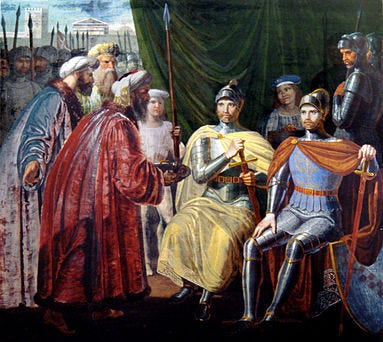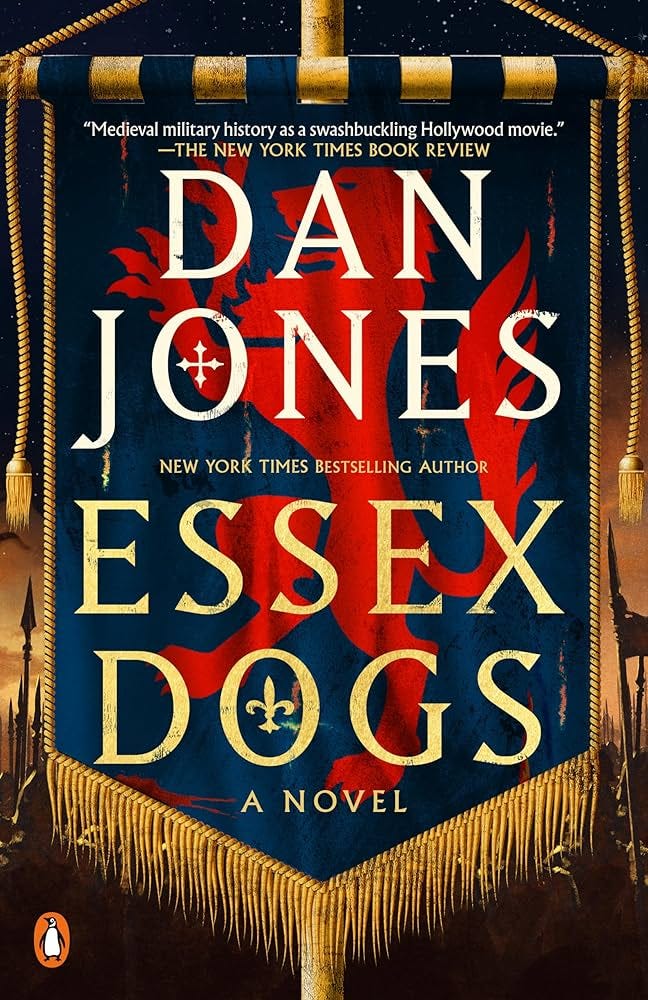My Favorite Historian, Dan Jones
Jones is a Fantastic Non-Fiction Writer who Combines Detailed Historical Context with Compelling Storytelling

Kings, Crusaders, and the millions who died for the infamous False Prophets of Medieval British History
Recently, I felt compelled to read Crusaders: The Epic History of the Wars for the Holy Land, a narrative history by best-selling author and historian Dan Jones. I did not go into this book blind. In fact, given my love for his previous works like The Plantagenets: The Kings Who Made England and The War of the Roses, I was certain this would be a compelling, engaging, and knowledgeable read likely to last with me long after the final pages were read. You see, Dan Jones is the author who got me into reading “histories,” as frustratingly vague as this genre description is. Gearing up for a summer seminar in Oxford, I was determined to learn as much as I could about the culturally rich country I was soon to be living a couple of months in, and the aforementioned two narratives provided experiences that not only elevated my personal time in England, but left me with unforgettable tales of epic wars fought for less than noble causes, young princes rising to success in fairy tale stories only to die old and embittered, and the millions of unmarked graves of common people trampled over by the madness of those who wielded a false but powerful “divine right.”
Picking up Crusaders now, after a seven-year hiatus, I was left with a story on par with all of Jones’ previous works, expanding his lens from England and France to the blood-soaked shores of Sicily, the explosive kingdoms of the South of Spain, passing the mighty but precarious walls of Constantinople, and finally the endless stretches of deserts in the Middle East, where hidden in those dunes lay divine gems that were the objects of desire of many holy wars.
Jones’ greatest strength as a historian is his ability to establish characters. Each of the many Crusades over the course of centuries covered in the book is alive with complex people destined to have egos and swords clash against one another. The opening paragraph introduces its first character with the line: “Count Roger of Sicily lifted his leg and farted. ‘By the truth of my religion,’ he exclaimed, ‘there is more use in that than in what you have to say.’” Now, if that’s not the best way to introduce a self-made warrior and ruler, the youngest of twelve sons who realized success would come to him faster earned than inherited, and who came up with the idea to use the Christian faith to conquer Jerusalem, then I don’t know what is. And to open a narrative history with a fart stands for more than an unexpected joke, as the Norman invaders led by Roger in taking Sicily from its Muslim occupiers were ridden with chronic flatulence from the bites of native tarantulas.

Crusaders features countless lesser nobles hellbent on manipulating Christian doctrines to achieve worldly glories, but Jones also sheds light on Vikings and Mongolians, ambitious Muslim generals, Popes and Anti-Popes, bloodthirsty monks, and women who became war heroes merely by fighting for their lives. However, one of the more compelling characters for me was Anna Komnene, princess of the Byzantine Empire. Though born into luxury, both in riches and loving parents, outside the empire’s walls, the future of the young Komnenos dynasty was far from certain. With Seljuk Turks posing as a serious threat to Constantinople’s security, Anna’s father, Alexios opened up negotiations with the west, leading to Pope Urban II calling for the First Crusade just a year later.
As mentioned, Anna loved her parents, so much so that later in life, she wrote The Alexiad, a detailed account of her father’s life and victories inspired heavily by Homer’s epic poems. Described by Anna as a “fiery whirlwind,” her father was a brave soldier and a wily strategist, and at the time, opening his gates to the Christian army was necessary for the preservation of his empire. In the immediate history of his reign, Alexios’ decision proved fruitful. With the help of the crusaders, the Seljuk Turks were fended off, Constantinople was secured, and the Christian army successfully captured Jerusalem from its Muslim settlers. Alexios would later defeat his rival, a renowned general of the First Crusade named Bohemond of Antioch, in a battle after the Holy Land was secured. Declared a “crusade” by the Christian prince of Antioch, Bohemond’s subsequent defeat forced him to recognize himself as the vassal to Emperor Alexios, delightfully recorded by Anna years later, whom she distrusted since the crusader army appeared en masse outside her walls.
What was most admirable about Anna Komnene was her scholarly contributions to history, literature, and religious philosophy. Though forced into a convent later in life after plotting against her brother following Alexios’ death, Anna made the most of her elder years becoming a credible historian, fascinated in a broad range of subjects including medicine, metaphysics, Biblical studies and Homeric verse. In fact, it’s due to her recorded histories that the First Crusade feels so alive in the present day, because she witnessed the actions of many of its iconic characters with her own eyes. The epic written about her father in her later years was the first major Western history written by a woman, providing invaluable information of the Byzantine court, the last surviving remnant of the “Roman” Empire, specifically in her father’s decision to open his doors to the western Christian army. The results of this decision, of which, can still be felt to this day.
Though all of Jones’ narrative histories are written with an aura of fun and entertainment, he concludes Crusaders with a frightful question. Though there has not been an official “Crusade” in about one thousand years, the memory of all those bloody wars continues to boil the blood of religious fanatics today. Just to name a few examples mentioned by Jones, both George W. Bush and Osama Bin Laden publicly invoked the victories and horrors of the Crusades during the War on Terror. The man who conducted the 2019 Christchurch Mosque shootings allegedly acted out of vindication against Islam for “1,300 years of war and devastation that it has brought upon the people of the West.” The name “Bohemond of Antioch” was written on one of his rifle cartridges. Right after Jones finished writing this very narrative history, he was on vacation with his family in Sri Lanka in the spring of 2019 when 250 people (most of whom were Christians) were killed in bombings of churches and restaurants throughout the island. One hotel, attacked by a suicide bomber, Jones planned to stay at later in his family’s trip. Regarding the tragic event, he writes, “Had the attack occurred twenty-four hours later, we might well have been maimed or killed.”
How Dan Jones writes history
At only forty-three years of age, Jones has already created an expansive bibliography of historical narratives. Sticking primarily with the medieval ages of British history, Jones has written broadly about the Plantagenet royal family and the hundreds of years of war making up The Crusades, to more specific moments in history like the Magna Carta, a document thrust upon King John of England forcing him to acknowledge that he was not above the law, and the Templars, an order of knights adhering to a strict Christian code essentially making them warrior-monks. Throughout his research, Jones remains objective, but not without a sense of humor. For all the buildup he gives the Knights Templar on their way to fight in the Crusades, and trust and believe the religious officials funding and propagandizing this order of holy knights surely had a lot invested in their success, the irony of their sudden downfall is written with a chuckle.
There is a passage from The War of the Roses that really epitomizes what I adore about Jones’ style of storytelling. Henry VI, a sickly and weak-willed king, is captured by his enemies, and so it is up to his wife, Margaret of Anjou, a wily and headstrong woman, to win him back. After a clash between Lancaster and York forces known as The Second Battle of St Albans, Lancaster forces were victorious. Henry VI, who allegedly watched the battle from underneath a tree, under the watch of two knights loyal to House York, laughing and singing during the carnage, was said to have danced with joy at the sight of his wife coming to his rescue.
It is an epic moment in English history, and it’s a credit to Dan Jones’ ability to tell a story that this scene was properly built towards. Henry VI inherited his throne at a young age, in the wake of his warrior-king father’s unexpected and untimely demise to dysentery after conquering the monarchy in France. Margaret of Anjou possessed a stronger will to get things done, and so in addition to the political benefits of their marriage, emotionally, Margaret provided the backbone the king needed to last as long as he did in the war. Alas, neither husband nor wife saw the end of the war. Both would end up captured and dying as despots not long after. However, their legend continues, and the strongest compliment I can give to Jones is that the emotion I felt when reading this scene for the first time has endured through many years and many, many more books.
Is Jones writing the right type of fiction?
Though Crusaders marks the end of an extended hiatus of reading his nonfiction books, I’ve still been an avid reader of his works in the past few years. In the fall of 2022, Dan Jones made his debut in fiction with the novel Essex Dogs, the first of a proposed trilogy following the titular “Essex Dogs” platoon as they tear up the Norman countryside during the Hundred Years’ War. A ten-man squadron of devious soldiers each with his own secrets better kept beneath a busted helm, we follow these characters on their way to Crécy, unknowingly approaching what will later be an iconic battle in European history.
Jones has written of the Hundred Years’ War and Battle of Crécy before, but never from the perspective of his own original characters. Here, he replaces King Edward III and the Black Prince with Loveday and Scotsman, and the result does not measure up. For a historian who puts such an exceptional focus on building the real people of his nonfiction, the same attention to detail is not provided for the characters of his fiction. Each of the Essex Dogs is a differing degree of angry. The characters with identifiable traits are usually run-of-the-mill (yes, Scotsman isn’t a sober altruist), and about half the platoon can be best classified as either an archer or Welsh. I was not expecting Loveday, Pismire, or Romford to be as complex as Leopold Bloom, but to cling so vehemently contrived characterizations and arcs feels like a direct contradiction to Jones’ intentions as a historian. Jones takes statues and glass morals and gives them flesh and pumping hearts (each to his or her own beat), but when left to his own devices, he makes puppets playing a part.
Real historical figures make cameos in Essex Dogs and its sequel, Wolves of Winter, but they are tertiary characters in the overall plot. While reading both the first and second novel in this series, I was bugged by a singular question: Why not take the Hilary Mantel approach? Her Cromwell trilogy focuses on the major players of Henry VIII’s court. The first novel, Wolf Hall, is an exceptional work of historical fiction I’ve read twice in under a year. Jones clearly has a talent for conveying the dimension of real people who walked (and in many cases destroyed) the world hundreds of years ago. Surely, if he wrote fiction inspired by Mantel’s emphasis on real history, the results have the potential to be tremendous.
My thoughts, however, are in the minority of opinions for the Essex Dogs trilogy. Wolves of Winter saw minor narrative and personality improvements, but not so significant to call it a worthwhile read. Regardless, both novels were financial and critical hits, so clearly he’s doing something right. That said, as a fiction writer, he has the potential to reach the highs of his nonfiction. With a major shift in what his fiction focuses on, he has the potential to create characters just as compelling as all the kings, queens, and deviant aristocracy in The Plantagenets, The War of the Roses, and Crusaders.



